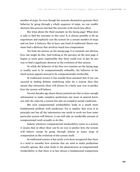number of steps. So even though the systems themselves generate their behavior by going through a whole sequence of steps, we can readily shortcut this process and find the outcome with much less effort.
But what about the third example on the facing page? What does it take to find the outcome in this case? It is always possible to do an experiment and explicitly run the system for a certain number of steps and see how it behaves. But to have any kind of traditional theory one must find a shortcut that involves much less computation.
Yet from the picture on the facing page it is certainly not obvious how one might do this. And looking at the pictures on the next page it begins to seem quite implausible that there could ever in fact be any way to find a significant shortcut in the evolution of this system.
So while the behavior of the first two systems on the facing page is readily seen to be computationally reducible, the behavior of the third system appears instead to be computationally irreducible.
In traditional science it has usually been assumed that if one can succeed in finding definite underlying rules for a system then this means that ultimately there will always be a fairly easy way to predict how the system will behave.
Several decades ago chaos theory pointed out that to have enough information to make complete predictions one must in general know not only the rules for a system but also its complete initial conditions.
But now computational irreducibility leads to a much more fundamental problem with prediction. For it implies that even if in principle one has all the information one needs to work out how some particular system will behave, it can still take an irreducible amount of computational work actually to do this.
Indeed, whenever computational irreducibility exists in a system it means that in effect there can be no way to predict how the system will behave except by going through almost as many steps of computation as the evolution of the system itself.
In traditional science it has rarely even been recognized that there is a need to consider how systems that are used to make predictions actually operate. But what leads to the phenomenon of computational irreducibility is that there is in fact always a fundamental competition




